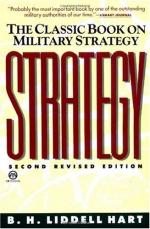
|
| Name: _________________________ | Period: ___________________ |
This test consists of 15 multiple choice questions and 5 short answer questions.
Multiple Choice Questions
1. Within the subject of grand strategy, what is one of the benefits of closed mindedness among the populace?
(a) They are more productive.
(b) They are less susceptible to psychological attacks.
(c) They will serve and die blindly.
(d) They are more likely to enlist for military service.
2. What is one of the main advantages of a large army?
(a) It cannot be defeated except by an equally large force.
(b) It can provide for itself.
(c) It can easily occupy and hold fortified locations.
(d) It can sustain significant loss of life.
3. During World War II, most maneuvers had the intention of attacking the enemy where?
(a) Along their entire front.
(b) In their rear area.
(c) In their capital cities.
(d) Along their coastlines.
4. Which of the following outcomes is NOT specifically mentioned as being important to plan for?
(a) Partial success.
(b) Standoff.
(c) Failure.
(d) Unexpected success.
5. Overall, what was the state of Hitler's grand strategy?
(a) He had no idea of the importance of grand strategy.
(b) He had well planned and positioned grand strategy.
(c) He could not handle the responsibility of grand strategy.
(d) He constantly fumbled the political side of grand strategy.
6. With regards to bloodless victories and attacks against targets other than human lives, the author states which of the following?
(a) These strategies are equally valid or more valid than direct combat.
(b) These results are impossible to achieve.
(c) Strategy should only include these factors.
(d) These results can only be obtained through high mobility.
7. "Limited aim" strategy generally precludes what type of outcome?
(a) Decisive results.
(b) Indecisive results.
(c) Bloodless victories.
(d) Psychological defeat of the enemy.
8. About how many soldiers did the Italians lose in their two and a half years of fighting in the First World War?
(a) One-hundred thousand.
(b) Two-hundred thousand.
(c) Five-hundred thousand.
(d) One million.
9. In the First World War, which Mediterranean nation did the allies hope to re-unify?
(a) Egypt.
(b) Croatia.
(c) Greece.
(d) Turkey.
10. How were Arab nations vulnerable during the First World War?
(a) They had no real firearms.
(b) Their supplies were extremely limited.
(c) They could not afford much loss of manpower.
(d) They had almost no communication or chain of command.
11. What tactic, employed by generals as early as Belisarius, was widely used in World War II?
(a) Overwatch.
(b) Human wave attacks.
(c) Entrenchment.
(d) Overlapping fields of fire.
12. According to the author, how should formations be arranged?
(a) In the way that most confuses the enemy.
(b) In a way that allows for rapid adjustments.
(c) With the best troops handling the most fighting.
(d) According to the design of unit commanders.
13. What is meant by "strength faces strength"?
(a) Heavy weapons and armor demand equally heavy arms in order to oppose.
(b) An army's front should always face the front of the opposing army.
(c) Strong nations only engage other strong nations.
(d) Armies will generally concentrate forces near each other.
14. Hitler missed an excellent opportunity to wipe out the English army in what region?
(a) Bastogne.
(b) Dunkirk.
(c) Whitfield.
(d) Brest.
15. In what strategic realm did Hitler fail?
(a) Strategy of diplomatic measures.
(b) Strategy of tactical movements.
(c) Local strategy.
(d) Grand strategy.
Short Answer Questions
1. Clausewitz himself admitted that his books had what flaw?
2. Which of the following best defines military strategy?
3. What was Napoleon able to accomplish that Hitler could not?
4. Overall, what is the quality of Hitler's generalship?
5. Which of the following nations was NOT a major player in the war on the eastern front?
|
This section contains 650 words (approx. 3 pages at 300 words per page) |

|




